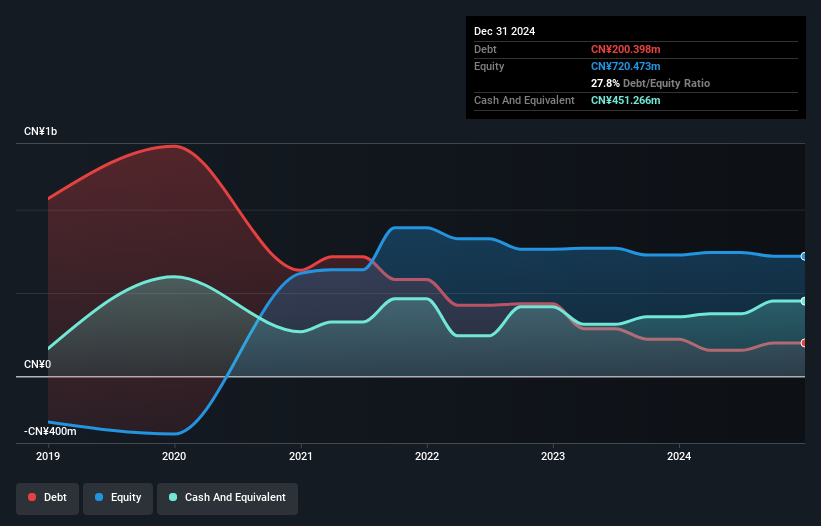Legendary fund manager Li Lu (who Charlie Munger backed) once said, 'The biggest investment risk is not the volatility of prices, but whether you will suffer a permanent loss of capital.' So it seems the smart money knows that debt - which is usually involved in bankruptcies - is a very important factor, when you assess how risky a company is. As with many other companies UNQ Holdings Limited (HKG:2177) makes use of debt. But the real question is whether this debt is making the company risky.
When Is Debt Dangerous?
Generally speaking, debt only becomes a real problem when a company can't easily pay it off, either by raising capital or with its own cash flow. Part and parcel of capitalism is the process of 'creative destruction' where failed businesses are mercilessly liquidated by their bankers. However, a more common (but still painful) scenario is that it has to raise new equity capital at a low price, thus permanently diluting shareholders. Of course, plenty of companies use debt to fund growth, without any negative consequences. The first thing to do when considering how much debt a business uses is to look at its cash and debt together.
What Is UNQ Holdings's Debt?
The image below, which you can click on for greater detail, shows that UNQ Holdings had debt of CN¥200.4m at the end of December 2024, a reduction from CN¥223.0m over a year. But on the other hand it also has CN¥451.3m in cash, leading to a CN¥250.9m net cash position.

How Strong Is UNQ Holdings' Balance Sheet?
According to the last reported balance sheet, UNQ Holdings had liabilities of CN¥440.9m due within 12 months, and liabilities of CN¥28.6m due beyond 12 months. Offsetting this, it had CN¥451.3m in cash and CN¥284.3m in receivables that were due within 12 months. So it actually has CN¥266.1m more liquid assets than total liabilities.
This surplus liquidity suggests that UNQ Holdings' balance sheet could take a hit just as well as Homer Simpson's head can take a punch. On this view, lenders should feel as safe as the beloved of a black-belt karate master. Simply put, the fact that UNQ Holdings has more cash than debt is arguably a good indication that it can manage its debt safely.
Check out our latest analysis for UNQ Holdings
Although UNQ Holdings made a loss at the EBIT level, last year, it was also good to see that it generated CN¥31m in EBIT over the last twelve months. There's no doubt that we learn most about debt from the balance sheet. But it is UNQ Holdings's earnings that will influence how the balance sheet holds up in the future. So if you're keen to discover more about its earnings, it might be worth checking out this graph of its long term earnings trend.
But our final consideration is also important, because a company cannot pay debt with paper profits; it needs cold hard cash. UNQ Holdings may have net cash on the balance sheet, but it is still interesting to look at how well the business converts its earnings before interest and tax (EBIT) to free cash flow, because that will influence both its need for, and its capacity to manage debt. Happily for any shareholders, UNQ Holdings actually produced more free cash flow than EBIT over the last year. There's nothing better than incoming cash when it comes to staying in your lenders' good graces.
Summing Up
While we empathize with investors who find debt concerning, you should keep in mind that UNQ Holdings has net cash of CN¥250.9m, as well as more liquid assets than liabilities. The cherry on top was that in converted 549% of that EBIT to free cash flow, bringing in CN¥172m. So is UNQ Holdings's debt a risk? It doesn't seem so to us. When analysing debt levels, the balance sheet is the obvious place to start. However, not all investment risk resides within the balance sheet - far from it. These risks can be hard to spot. Every company has them, and we've spotted 3 warning signs for UNQ Holdings (of which 1 is a bit unpleasant!) you should know about.
At the end of the day, it's often better to focus on companies that are free from net debt. You can access our special list of such companies (all with a track record of profit growth). It's free.
New: AI Stock Screener & Alerts
Our new AI Stock Screener scans the market every day to uncover opportunities.
• Dividend Powerhouses (3%+ Yield)
• Undervalued Small Caps with Insider Buying
• High growth Tech and AI Companies
Or build your own from over 50 metrics.
Have feedback on this article? Concerned about the content? Get in touch with us directly. Alternatively, email editorial-team (at) simplywallst.com.
This article by Simply Wall St is general in nature. We provide commentary based on historical data and analyst forecasts only using an unbiased methodology and our articles are not intended to be financial advice. It does not constitute a recommendation to buy or sell any stock, and does not take account of your objectives, or your financial situation. We aim to bring you long-term focused analysis driven by fundamental data. Note that our analysis may not factor in the latest price-sensitive company announcements or qualitative material. Simply Wall St has no position in any stocks mentioned.
About SEHK:2177
UNQ Holdings
Operates as a brand e-commerce retail and wholesale solutions provider in the People's Republic of China.
Solid track record with excellent balance sheet.
Similar Companies
Market Insights
Community Narratives





